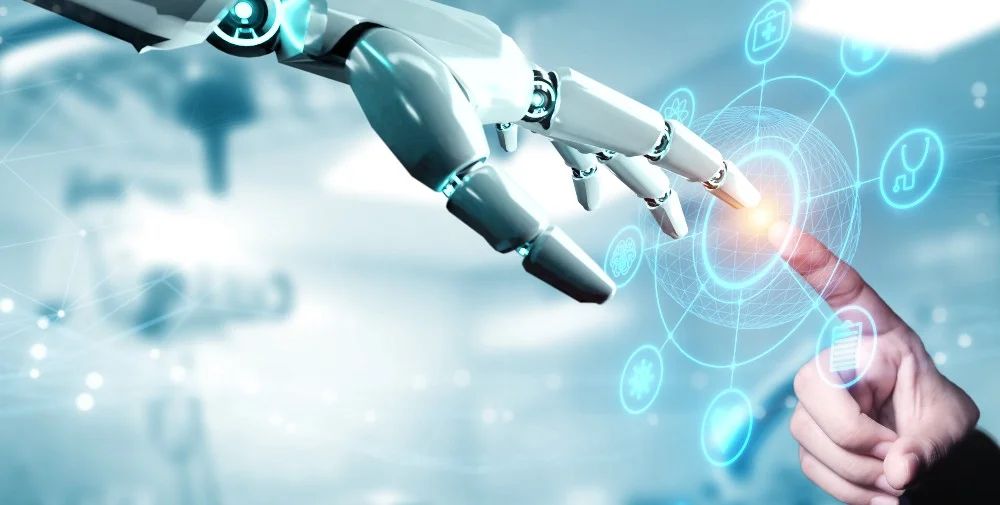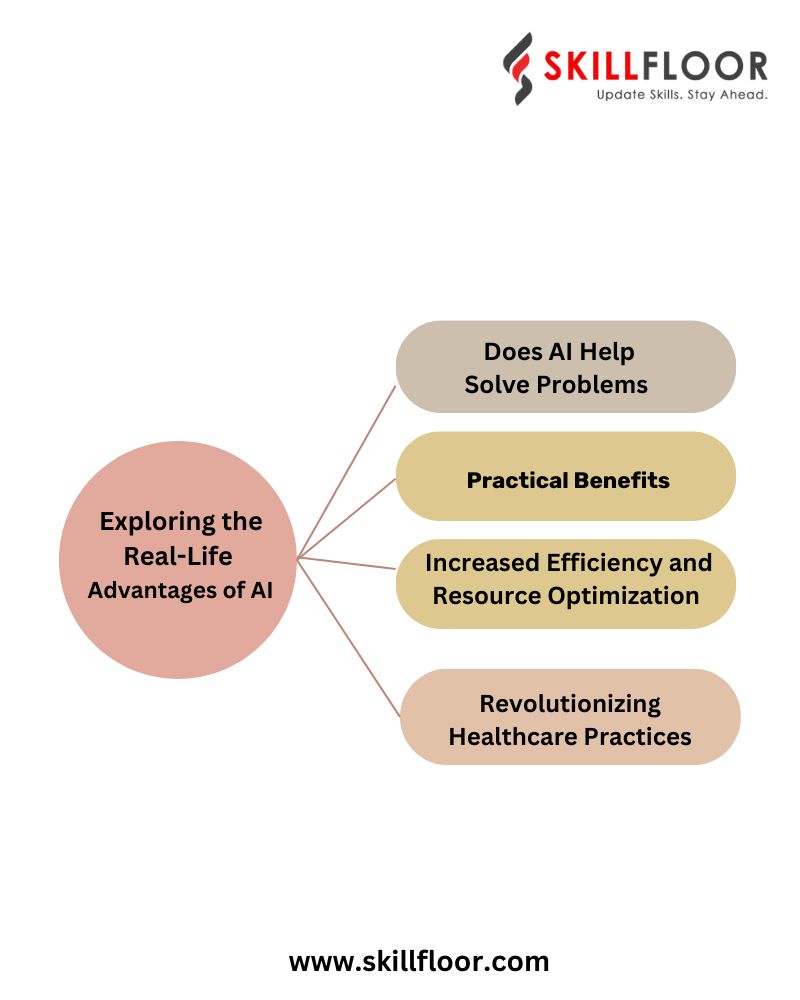Exploring the Real-Life Advantages of AI
Discover the tangible benefits of AI in real-life scenarios. Explore how artificial intelligence transforms everyday experiences and enhances efficiency.

AI has become a part of many different industries like healthcare, finance, and manufacturing. It has become integrated into our daily lives and has changed the way businesses work and how people use technology. In healthcare, AI helps doctors make more accurate diagnoses and create personalized treatment plans. This has a positive impact on patients and their health. In finance, AI helps people understand complicated market trends so they can make smarter investment choices. And in manufacturing, AI helps automate processes to make them more efficient. AI has a big impact on many areas of our lives, and as it continues to develop, it will bring even more innovation and efficiency. This means that in the future, humans and intelligent systems will work together to create amazing advancements.
We receive a lot of information constantly. Understanding everything can be challenging. AI helps by being a useful assistant in this overcoming world of information. It sifts through the massive sea of data and filters out valuable hints that may be missed by humans. This not only helps businesses understand patterns and trends but also enables them to make informed decisions based on a deeper understanding of their data. AI does more than just manage data; it also addresses efficiency and productivity gaps within organizations. By automating tasks, both simple and complex, AI allows businesses to streamline their operations. This not only reduces the risk of human error but also optimizes the allocation of resources, leading to overall improved efficiency. In the field of healthcare, AI is causing a significant shift. It is improving the accuracy of diagnoses and creating personalized treatment plans. These advancements not only save lives but also reduce healthcare costs and contribute to the development of innovative medical treatments. The healthcare sector is experiencing tangible benefits as AI continues to evolve and transform patient care.
How Does AI Help Solve Problems?
AI helps overcome challenges and find solutions in many fields. One way it does this is through data analysis and pattern recognition. With AI, businesses can easily analyze large amounts of data in real time, which is especially beneficial in industries like finance. This allows for predicting market trends and making informed decisions for success.
Another way AI helps is through automation and process optimization. It takes over monotonous and time-consuming tasks, freeing up humans to focus on more creative and innovative aspects of their work. This not only increases job satisfaction but also leads to more efficient and effective processes.
In the field of healthcare, AI is like having a genius doctor available 24/7. AI algorithms assist in medical imaging, making X-rays and MRIs more accurate. This helps doctors identify possible health issues at an early stage, leading to timely interventions and possibly saving lives. Additionally, AI reduces the need for invasive procedures and helps control healthcare costs, making healthcare smarter and more accessible.
Overall, AI contributes to overcoming challenges by analyzing data, automating tasks, and improving healthcare outcomes. It makes complicated tasks easier, improves decision-making, and ultimately leads to improved outcomes.

Practical Benefits
Improving Decision-Making
AI is not just a trendy term; it is a valuable tool that has real-world advantages for decision-making. By quickly analyzing data, AI can uncover insights that humans might miss. In areas like business and finance, this translates to making informed and strategic decisions rather than relying on guesswork. AI acts as a helpful guide, assisting organizations in achieving success by offering personalized experiences for customers and providing data-oriented hints for investment decisions and risk management. With AI as a dependable assistant, decision-making becomes more efficient and based on intelligence.
AI algorithms can be utilized to spot patterns and abnormal behavior in financial transactions, aiding in the identification of possible fraud. These algorithms examine vast amounts of data in real-time and can promptly highlight suspicious transactions, alerting either the financial institution or the customer. This technology enhances the security of financial transactions and assists in the prevention of fraud.
In the financial industry, AI-powered chatbots and virtual assistants are changing the way customer support is provided. These chatbots can communicate with customers, answer their questions, and assist with various financial services. By automating common inquiries, AI-powered chatbots offer faster and more efficient customer support, ultimately improving the overall satisfaction of customers.

Increased Efficiency and Resource Optimization
Think about how much simpler your everyday tasks would be if they went smoothly, just like a machine that has been well-moothed. This is exactly what automation powered by AI can do. It's not about replacing humans, but rather allowing them to focus on the more interesting aspects of their work. AI can handle routine administrative tasks and solve complex problems, freeing up time and resources. Businesses can optimize their operations, from managing supply chains to providing excellent customer service. This leads to cost savings and increased efficiency, benefiting everyone involved.
In supply chain management, AI can optimize logistics processes by predicting demand and ensuring products reach their destination efficiently. This not only saves time but also reduces the chances of errors that can occur in manual processes. Customer service also benefits from AI. Chatbots, powered by AI, can handle routine queries and provide instant responses, allowing human agents to focus on more complex issues. This not only leads to satisfied customers but also allows the workforce to concentrate on tasks that truly require a human touch.
Revolutionizing Healthcare Practices
Healthcare is experiencing a transformative journey with AI at its forefront. Picture a scenario where diseases are not just treated but predicted and prevented – that's the promise of AI in healthcare.
-
AI is making healthcare better by predicting and preventing diseases, not just treating them.
-
Doctors can use AI to detect diseases early, leading to better treatment outcomes and less invasive procedures.
-
AI tailors treatments to each patient's unique characteristics, increasing the chances of success.
-
Think of AI as an extremely intelligent assistant that can analyze massive amounts of data to find new treatments and therapies.
-
AI is revolutionizing healthcare practices, making them more personalized and effective.
In our journey through the ever-changing world of artificial intelligence, it's important to understand the real, everyday benefits that go beyond the hype and excitement. AI is not just a trendy term; it's a useful tool that can solve real problems, inspire creativity, and bring positive change to different fields. When we use AI wisely, it becomes more than just an impressive technology; it becomes a solution to the challenges we face in our daily lives. Recognizing the actual advantages of AI is like realizing the power of a reliable friend who is always there to help. It's not about getting caught up in fancy terminology, but appreciating how AI can truly make a difference. By embracing and understanding these tangible benefits, we pave the way for AI to continue being a positive force, shaping a future where innovation and progress go hand in hand. So, let's explore the world of AI with a clear understanding of its practical benefits, ensuring that it remains a tool for positive transformation in the years to come.



























































